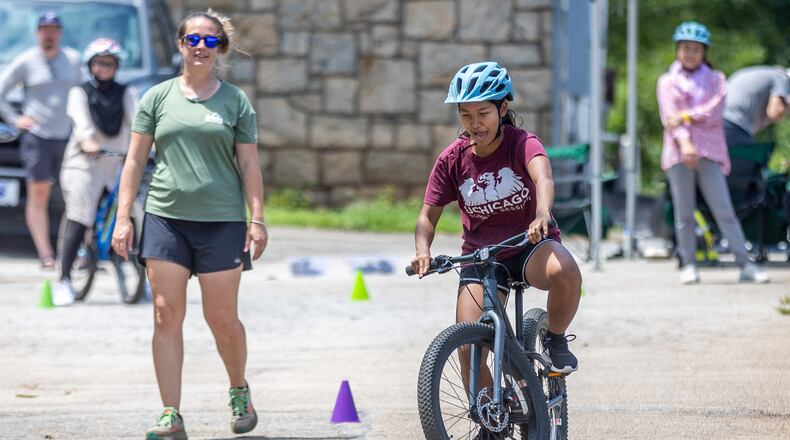It took Maryam Ayam 35 years and a move to the U.S. to sit on a bike saddle for the first time.
Growing up in Afghanistan, Ayam watched her brothers be gifted bikes and go riding with their friends. But it was frowned upon for girls to cycle – or do much of anything outside the home – so she never learned.
That changed on a recent Saturday when Ayam joined roughly 20 other immigrant and refugee women in a free group biking class in Decatur, organized by the Atlanta-based Refugee Women’s Network.
The biking program is the latest offshoot of a pandemic-era initiative meant to boost fitness among refugee women and keep at bay the social isolation that newcomers often face, all while helping participants become more familiar with greater Atlanta. The fitness push began in 2021 with group hikes, and gradually grew to encompass swimming lessons, paddling, and now biking.
“There’s a lot of need for social connection. And that’s what a lot of our health outreach is based on. It’s community, it’s helping people feel a sense of belonging,” said Temple Moore, community health program manager at the Refugee Women’s Network. “And the other piece is also a sense of capability … You can do hard things and, in that challenge, feel not only physically but also emotionally a sense of accomplishment. And that’s really important when we’re talking about trauma recovery.”
Credit: Steve Schaefer
Credit: Steve Schaefer
Moore also hopes that helping refugee women feel comfortable on bikes will alleviate the transportation challenges many of them face. The Refugee Women’s Network, with the help of corporate sponsors. plans on giving women their own bikes once they learn to ride.
“In the refugee journey, transportation is a huge barrier,” she said. “I often think wow, it would be so great if these women knew how to safely ride bikes, because they wouldn’t have to say no to certain things, they wouldn’t have to rely on Uber and Lyft to go two miles down the road … They would be able to go run errands and do things and just get out of the house.”
For the women who were getting ready to try riding for the first time, excitement mixed with apprehension.
That was the state of mind Tahira Abbas, also 35, was in.
In 2016, Abbas moved to the U.S. from Pakistan, where she was persecuted for belonging to the Ahmadi Muslim sect, a minority religious group. The sense of danger that came with being out in public meant she was unable to learn to ride as a young girl.
Credit: Steve Schaefer
Credit: Steve Schaefer
“Our parents were scared to send us outside when we were kids. [Bike riding] never came in my mind when I was a kid,” she said. “So when I heard about this program, I said, ‘Okay, this is something I should take advantage of.’ … It seemed like an adventure for me.”
On Saturday, the women started out on bicycles with no pedals, and saddles lowered nearly all the way down, which allowed them to push off the ground with their feet. As they figured out how to stay balanced on the bike, they gathered momentum and then lifted their feet up, trying to remain upright as long as they could.
On hand in Decatur courtesy of an invitation from the Refugee Women’s Network was Rukhsar Habibzai, an Afghan refugee currently living in Virginia. In 2016, Habibzai was nominated for a Nobel Peace Prize after founding a women’s cycling team. She hopes to one day be part of the U.S. Olympic team.
During her visit to Atlanta, Habibzai told the biking beginners about how she had stones thrown at her while training in Afghanistan, but persevered.
“I faced a lot of challenges and barriers and still I’m working hard to reach my goals … I’m so honored to inspire them” she said of her fellow refugees. “We have the same story.”
During the course of the Saturday biking lesson, the women who got a handle on cycling the fastest were the youngest of the group.
Mang Bor Cin, 22, and Van Ni Par, 18, are sisters from Myanmar, where their family didn’t have the money for bicycles. They settled in metro Atlanta in 2016.
“My friends here are like, ‘Let’s go on a bike ride Saturday morning’ and I’m over here like, ‘I don’t know how to ride a bike’ and they all look shocked,” Mang Bor Cin said.
By the end of Saturday’s class, both sisters were riding smoothly and weaving through cones.
“Our goal is to ride around Stone Mountain,” where they live. “There’s also a trail in Clarkston that if we walk it’s too far. Maybe we could ride around it. It’s really beautiful in the spring. I know there is a very long row of flowers,” Mang Bor Cin said. “So, that would be fun.”
Credit: Steve Schaefer
Credit: Steve Schaefer
The Atlanta Journal-Constitution and Report for America are partnering to add more journalists to cover topics important to our community. Please help us fund this work at ajc.com/give
About the Author
Keep Reading
The Latest
Featured




